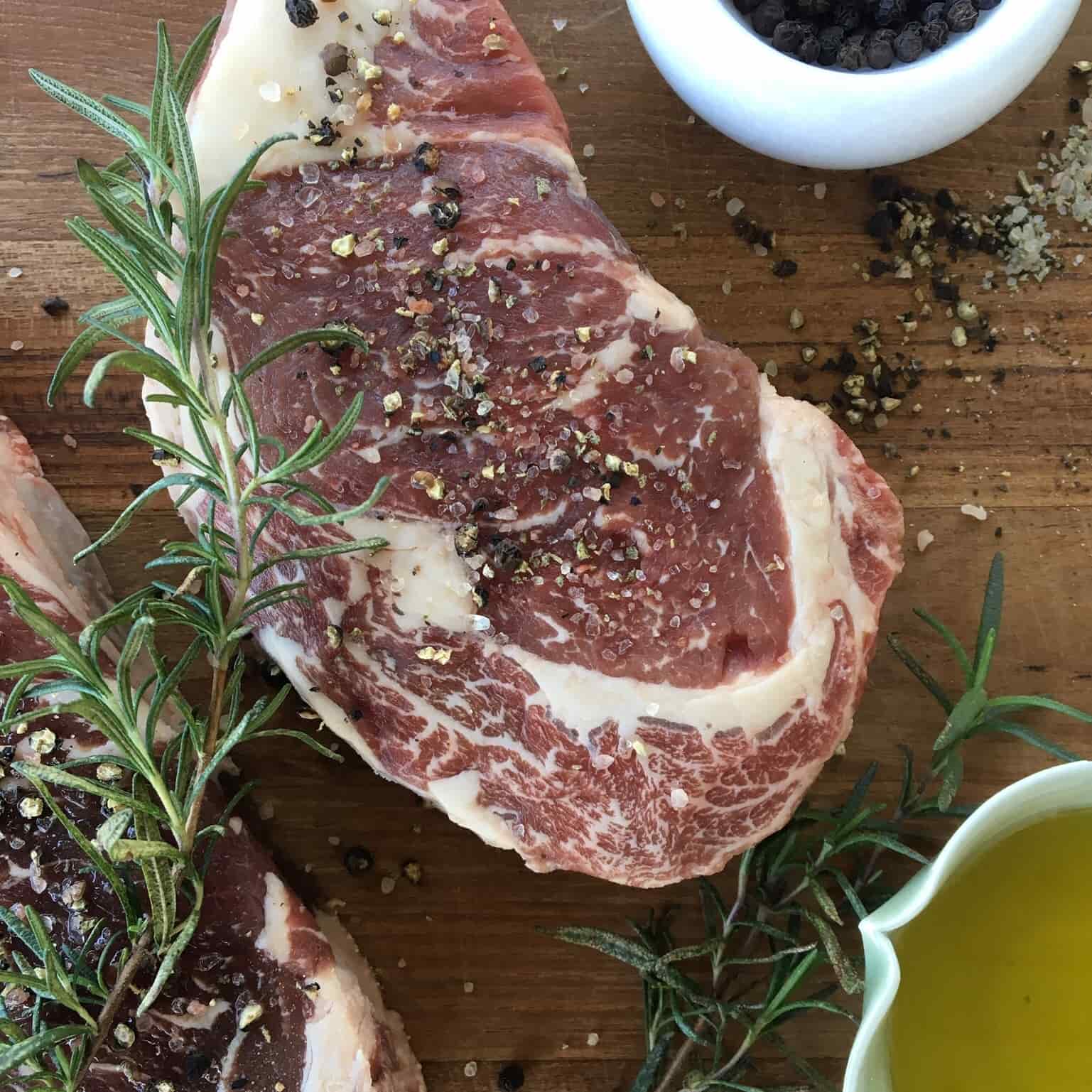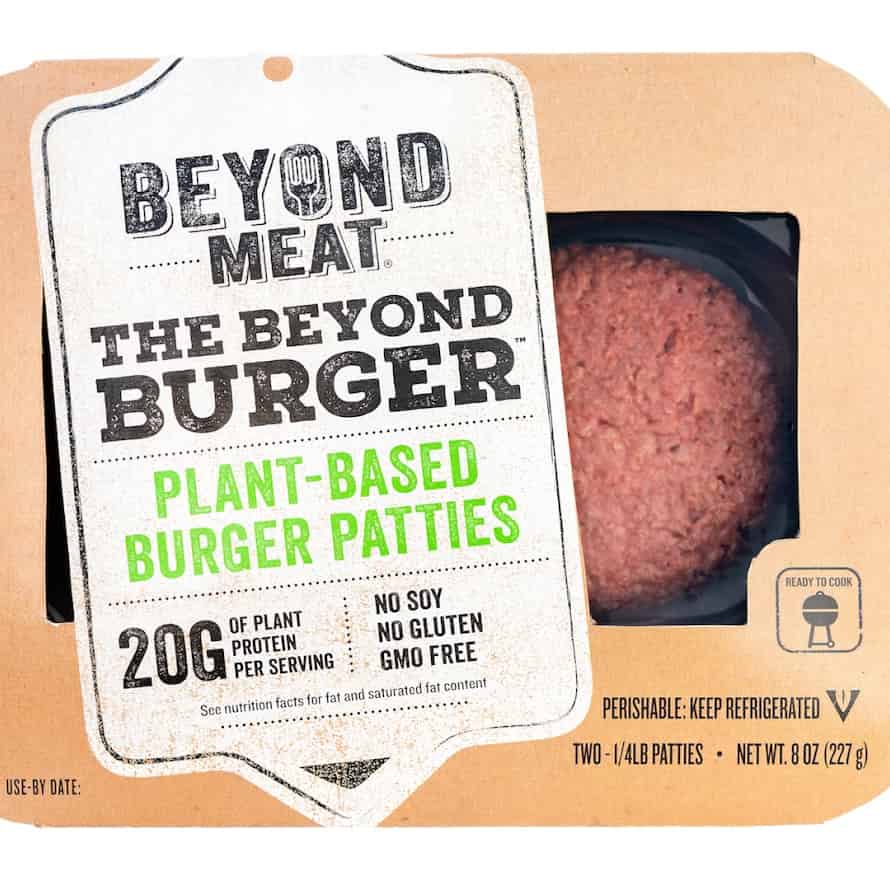Trying to avoid meat, especially red meat? Now you can have your burger and eat it too! I’m already cooking up my next blog post about why you have been misinformed about red meat but today I want to focus on the face-palm that is Beyond Burgers. I believe there are absolutely flaws with our food system and meat production but I do not think that Beyond Burgers or fake meat products are the answer. In fact I think they make things worse for us. Read on to find out why!


Here we have two types of food. A lovely thick steak from a 100% grass-fed farm where the family is earning a living humanely raising animals and providing food for the community. And then we have a “plant-based” burger made from highly processed pea protein isolate, industrial seed and refined oils that are totally damaged by the time you consume them, and a long list of additives to affect the flavor, color, and consistency of the burger.
If you want to eat more plants – go for it! Eat more actual p l a n t s. I can’t get behind these as a replacement for real actual meat though. Not nutritionally, not ethically, not environmentally…
Factory farmed beef is terrible for the animals, the environment, and the nutritional content of the meat isn’t great either. That’s all true. But meat from an animal doing its part in the life cycle of the earth and environment – allowed to eat its natural species diet, and especially if we can get it from somewhere close to home, is a much better option than something designed by food scientists with highly processed ingredients. We really can’t just lump all meat into one box and say “it’s bad.”
Let’s start with the nutritional differences.
First ingredient in the Beyond Burger is water. Great, no issues there. That’s about where the good stuff stops. Next is pea protein isolate. My main beef (ha) with this ingredient is that it can be hard for many people to digest well. If you have any kind of gut disturbance (allergies, autoimmune, IBS, hormone issues, chronic fatigue, mental health/mood issues all have a gut component so if you struggle with any of these, or really any health problem, you probably have some degree of gut dysfunction), pea protein isolate is not going to be very easy on your digestive system and could exacerbate your symptoms and health problems. It’s not necessarily a terrible ingredient if someone tolerates it okay but it also has to go through a process to be converted from its whole food form into this powder. As a general rule, animal foods are easier to digest and absorb, so if the choice is between beef that hasn’t been altered or pea protein isolate I’m going to choose beef.
Next we move to expeller-pressed canola oil. I am glad that this is at least expeller pressed and Non-GMO but it isn’t organic. Rapeseeds (which is what canola oil comes from), unless organic, are sprayed with pesticides that not only wind up in the final product but also are harmful to the farmers exposed to them and the environment. So I don’t love that. But, it’s at least not refined canola oil, which would be worse.
We do get refined coconut oil in these though. Some refined coconut oil is refined using steam and not harsh chemicals and is generally organic. Companies would want you to know if they were using that kind so it would say if it was. Otherwise, the refining process involves chemical solvents to extract the oil and then deodorizes and bleach to leave the final product odor and flavorless. So this is not an ingredient I can get behind.
Then we have less than 2% of a whole bunch of things. Methylcellulose is a laxative, maltodextrin is a white powder derived from any kind of starch, but likely corn (could also be from wheat so unless a product states that it is gluten free if it has this ingredient it could contain gluten). It can disrupt beneficial gut bacteria (1) and has zero nutritional value. It’s there to be a filler or preservative, but our bodies need nutrients, not fillers and preservatives. Vegetable glycerin is made from soy, coconut, or palm oils (2). Likely refined versions of those. So again, highly processed product with zero nutritional value. Modified food starch could also be from various sources and goes through a process involving various chemicals. And yet again, zero nutritional value. And then there are several other ingredients for color, natural flavor which could be any number of not so natural things (this term is not well regulated at this point), and sunflower oil which is also, unless otherwise stated, a highly refined industrial seed oil that is inflammatory to our bodies. And all those starches, additives, gums, preservatives, etc. have an effect on our gut microbiome. They are not natural foods.
Now, let’s look at the nutritional profile of grass-fed beef.
We have one ingredient: beef. It provides bio-available b vitamins, iron, zinc, antioxidants, omega-3 fatty acids, CLA – a fatty acid that fights inflammation, boosts the immune system, and assists in weight loss. People tend to think that red meat is high in saturated fat (which isn’t necessarily a bad thing anyway) but it’s actually quite possibly higher in monounsaturated fatty acids, the same fatty acids found in extra virgin olive oil (3). The fats in grass-fed beef can help raise your protective HDL cholesterol. There’s a lot of great stuff in that grass-fed steak!
The next reason many people are choosing fake meats like Beyond Burgers is for ethical reasons.
This is a much bigger topic than what I’m going to get into and I absolutely respect people struggling with eating animals. If you choose not to eat meat or fish because you can’t stand the thought of an animal dying for your food, I get that.
But, to pretend that there is no death involved in the production of fake meat (or any other plant-based product for that matter) is not being aware of what’s really going on.
That ignores the bees and insects killed by pesticides sprayed on many of those ingredients. That ignores the little rodents living in the fields where the peas, corn, wheat, etc. are grown getting killed by machines used to harvest those crops. There is always death in food production. If I can consume meat from an animal that I know had the life that animal deserves and was harvested in a quick and painless way, I feel I am making an ethically sound decision.
I do realize this topic goes way beyond one paragraph and I definitely will not pretend to be ethically superior in all areas, not. even. close. I know I need to do better in many ways. I just don’t think choosing these fake meat products instead of grass-fed beef is the more ethical thing to do.
Lastly, many people tout the benefits of Beyond Burgers from an environmentally sustainable standpoint.
Like the ethical reasons, this is a complicated, nuanced, and beyond-my-scope-of-knowledge topic but given what I’ve learned, I believe seeking grass-fed, especially local meat is better for the environment than buying a package of beyond meat. Think of the energy that goes into the production of those processed ingredients. Where were those crops grown? How much transportation was needed to get all those final products to your plate? If more people turn to the fake meats that will mean more crops needed to provide the ingredients. So that means more mono-crops grown over and over again on soil that becomes depleted of minerals. And that doesn’t take into account the pesticides sprayed over and over. Is that sustainable?
Additionally, 60% of the world’s agriculture land is only suitable for grazing livestock (4), not for growing crops. If those lands are used for crops, within a few years the land is “exhausted” and no longer suitable for crops OR grazing (4). Grazing animals on these lands actually helps the environment by increasing biodiversity and improving the water-holding abilities of the soil. A recent study of a farm utilizing regenerative grazing practices found that they actually absorb more carbon than they omit, when taking into account all greenhouse gases of their farming operation (5).
I absolutely believe that the way most livestock are raised in this country is terrible. CAFOs (concentrated animal feeding operations) are horrendous for the health and treatment of the animals, for the environment, and not great for our own health either. This needs to change but I don’t think the way to do is by putting our resources into designing and producing fake meats.
What if our money, time, and technology went into regenerative agriculture, which can actually benefit the environment, instead of creating more processed food that only further pollutes our earth, depletes our soils of nutrients, and fills our bodies with unhealthy ingredients?
If you are choosing Beyond Burgers or something similar for environmental reasons, I’d suggest using your dollars to support farmers who are utilizing practices that enhance the health of the environment and show respect for the animals they raise.
I have no problem with someone wanting to consume less meat, if that’s what feels best for them. If you want to eat more plants, go for it! Eat more actual plants, not these highly processed and refined fake burgers. You could make a burger patty out of beans, sweet potatoes, and/or quinoa or something similar. What doesn’t make sense to me is choosing a Beyond Burger because it’s healthier or better for the environment.
I’ve been talking about Beyond Burgers this whole time – the other main option out there is the Impossible Burger. Don’t even get me started on that one. As much as I don’t like the ingredients in Beyond Burgers, the Impossible Burgers are even worse.

I tired an impossible burger and all i could ask is why?? I am a real meat gal and try to get organic grass fed meats or get meat at a butcher that uses their cattle, chickens, etc.
I figured the veggie burgers had so many other chemicala or unhealthy ingredients to make it appear to be a burger.
Couldn’t agree more Linda!
I couldn’t agree more! I try to eat less meat and be conscious of where my food comes from, but I do choose local meats over highly processed “fad” alternatives to meat. If only there were more local farmer markets around to have better food options!
I think that’s a great approach Heather, and I agree – it would be nice if there were more options for better sourcing. I think that’s part of the problem, we’re putting more time/money/energy into mass producing these processed products instead of into creating more regenerative/sustainable farms. And I’m definitely not perfect when it comes to sourcing the best food but I think if we all do the best we can with sourcing our food and “vote with our dollars” by supporting those who are raising and growing food sustainably, we will have a bigger impact than if we all run out and buy Beyond Burgers! 🙂
This is a interesting article by the way. I am going to go ahead and save this article for my sis to read later on tomorrow. Keep up the high-quality work.
I agree with you about the Beyond burgers, they are not created with the best health intentions. I stopped eating them after my cholesterol levels were high. Staying on a low saturated fat diet cleared all that up for me. But your article keeps comparing fake meats to grass-fed cattle. To have a fair comparison since grass-fed cattle only account for less than 1% of the total conventional cattle you should also include conventional cattle farming and its harmful effects. Beef production has several distinct and significant impacts on the environment. More agricultural land is used to raise cattle than all other domesticated animals and crops combined. In addition, cattle eat an increasing proportion of grain produced from agriculture, are one of the most significant contributors to water pollution and soil degradation, and are a major source of greenhouse gas emissions. Finally, processing cattle into meat, meat by-products and leather is a major source of pollution in many countries. One more thing, you mentioned, about insects, bees, and little rodents being killed, what food do you think they feed the non-grass-fed cattle? Corn, soy, wheat, etc.
Well, your article appeared in my search when I googled do Beyond Burgers contain insects to increase the protein levels… as my son said he heard they did. I love red meat. I miss red meat. You have left out an entire population of people who are unable to eat red meat due to health reasons. Neither my husband, who has to manage his purine levels due to Tofus Gout (he travels too much for work and his diet was very poor), and my health concern which is polycythemia – where my iron levels are off the charts too high – for no explained reason. It’s described as a type of untreatable cancer like illness that can only really be managed, in part, by cutting out foods that contain iron in higher levels. I haven’t eaten any red meat in over two years. So, I will deal with the lesser “health risks” that you mention and continue to get my occasional burger fix with one every month or two and not sweat the small stuff. I for one, am extremely grateful there is something better than the old “veggie burgers” or portabella mushroom caps that were one’s only options, prior to their introduction.